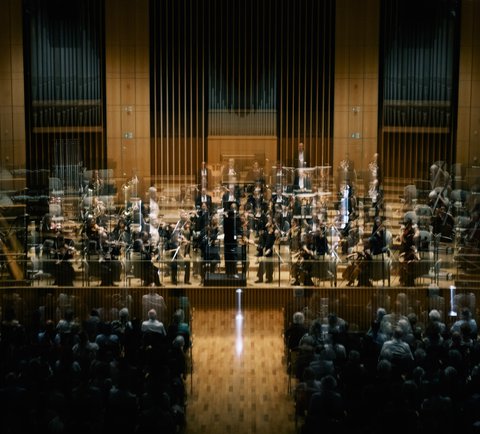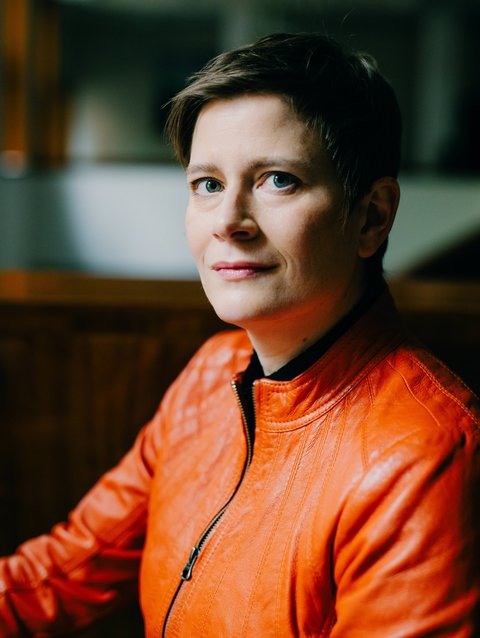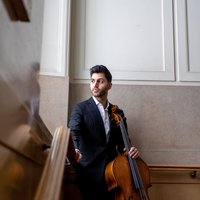It begins with mockery. A composer sits down at his desk not to create something new, but to reassemble the old. Like an alchemist, Bernd Alois Zimmermann brings together fragments from the past to create a piece that resonates with madness, irony and fury: »Musique pour les soupers du Roi Ubu«— music for the dinners of King Ubu. Conductress Anja Bihlmaier has included it in her Beethovenfest 2025 concert programme.
»Musique pour les soupers du Roi Ubu«
Zimmermann’s Quoted Mayhem

But who is Ubu? A figure of fun? A monster? A mirror? In Alfred Jarry's absurd drama from 1896, King Ubu rules with stupidity and violence. He is a greedy tyrant and a grotesque ruler who enters the stage with the word »Schreiße«. Zimmermann has made him the protagonist of a ballet score that he himself called »Ballet noir«. It is a dance on a razor's edge — between laughter and fear, garish farce and bitter truth. Zimmermann pulls out all the stops: the piece is a collage, a satire, a ballet, an archive of quotations and an indictment. »Ultra« in its compression and »ultra« in its fury. Thus, it is entirely in keeping with this year's festival motto, »Alles ultra«, which asks: What is too much, and what is just right?
Anja Bihlmaier will be conducting the »Ubu-Musik«. She emphasises: »It is a political piece that couldn’t be any more on theme. It portrays the dictator as a vicious political clown. His tools of the trade are power-mongering, disinformation and the fulfilment of fantasies of omnipotence through terror. It's a murderous farce that is so absurd it's almost true.«
Zimmermann’s work is an ambiguous sound collage. Its basic layer consists of baroque dances, newly arranged. Above that: Quotes from marching music, sacred chorales, opera, pop and jazz. Everything is allowed as long as it ›speaks‹. And everything speaks - sometimes quietly, sometimes screaming. The »Radetzky March« meets Bach’s »Brandenburg Concerto«, Wagner’s »Meistersinger« meets Beethoven’s »Pastorale«. Music becomes a historical archive. But also a battlefield.
Right from the start, the »Entrée« resembles a haunted house of music history. Zimmermann quotes music from colleagues (only men of course) from the Academy of Arts - he steals entire musical sections or melodies, so to speak, with respect, irony or quiet mockery, and recombines them on different musical levels. Mussorgsky, Hindemith, Fortner, Beethoven, Wagner. Even the President of the Academy at the time, who was an architect, is ›cited‹ with melodies in the horn section that trace the letters of his name. Zimmermann leads us through this panopticon like a museum guide would through a cabinet of curiosities. Only in this case, the guide is part of the exhibition himself.

Everything culminates in the last movement which Zimmermann calls »March of brain squashing«. Timpani rhythms from Berlioz’ »Symphonie fantastique«, an endlessly repeating chord from Stockhausen’s »Klavierstück IX«, and the quote of quotes: Wagner’s »Ride of the Valkyries«. A soundscape that accompanied wars, underlined racism and fuelled propaganda. But Zimmermann does not write music against war. He shows how music itself can transform into one. A battle appears at the centre of chaos: Wagner against Stockhausen– two composers who could not be any more different from each other. Wagner, who conjured up mythological grandeur with his masses of sound and later was instrumentalised for ideological violence by the Nazis, and Stockhausen, who described himself as a pioneer of the avant-garde. Zimmermann once called him a »usurper, a Franz Josef Strauss of New Music«. That perhaps says more than any analysis could.
In the end, the question remains: is this piece simply music – or is it already an indictment in itself? Zimmermann calls his work »a tremendous joke«, »staid and seemingly cheerful«, but at the same time a »cautionary poem«. Anyone who listens carefully will recognise that this musical collage is by any means no innocent game. It is a serious, sad and angry piece. It raises the question: What is art permitted to do? How does power influence sound? And has humanity long since perished?
Anja Bihlmaier says: »Freedom has been abolished and art is being disposed of in an act of musical violence. If we want to save it, we have to realise that it is not a luxury but a necessity.«
This is the sound of King Ubu's supper. It is not a feast. It is a dance of the dead.
This »ultra« piece of music can be heard live in concert with cellist Kian Soltani & the Deutsches Symphonie-Orchester Berlin on 31 August 2025 at the Bonn Opera under the direction of Anja Bihlmaier.
- , Opera Bonn
Kian Soltani & Deutsches Symphonie-Orchester Berlin
OrchestraAnja Bihlmaier
Tschaikowsky, Zimmermann, Schostakowitsch
